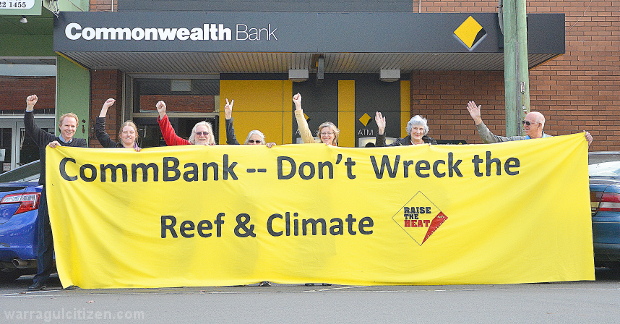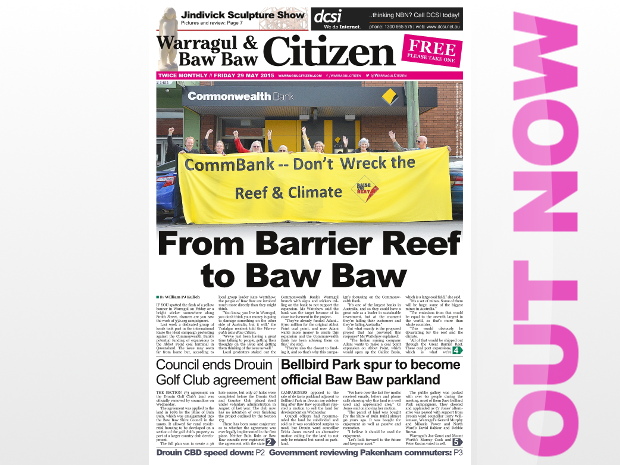
IF YOU spotted the flash of a yellow banner in Warragul [in May] or a bright sticker somewhere along Smith Street, chances are you saw the work of 350.org campaigners.
First published in the 29 May 2015 edition of the Warragul & Baw Baw Citizen.
ADVERTISEMENT
Last week a dedicated group of locals took part in the international Raise the Heat campaign protesting against the Commonwealth Bank’s potential funding of expansions to the Abbot Point coal terminal in Queensland. The issue may seem far from home but, according to local group leader Kate Wattchow, the people of Baw Baw are involved much more directly than they might think.
“You know, you live in Warragul, you don’t think your money is going to damage something on the other side of Australia, but it will,” the Trafalgar resident told the Warragul & Baw Baw Citizen.
“We’ve just been having a great time talking to people, getting their thoughts on the issue and getting them thinking of the issue as well.”
Local protesters staked out the Commonwealth Bank’s Warragul branch with signs and stickers calling on the bank to not support the expansion. Ms Wattchow said the bank was the target because of its close involvement in the project.
ADVERTISEMENT
“They’ve already funded Adani… $700 million for the original Abbot Point coal point, and now Adani wants more money to create this expansion and the Commonwealth Bank has been advising them on this,” she said.
“They’re also the closest to funding it, and so that’s why this campaign’s focussing on the Commonwealth Bank.
“It’s one of the largest banks in Australia, and so they could have a great role as a leader in sustainable investment, but at the moment they’re failing their customers and they’re failing Australia.”
But what exactly is the proposed project that has provoked this response? Ms Wattchow explained:
“The Indian mining company Adani wants to make a coal point expansion on Abbot Point, which would open up the Galilee Basin, which is a large coal field,” she said.
“It’s a set of mines. Some of them will be huge, some of the biggest mines in Australia.”
“The emissions from that would be equal to the seventh largest in the world, so that’s more than whole countries.
“This would obviously be devastating for the reef and the climate.
ADVERTISEMENT
“All of that would be shipped out through the Great Barrier Reef. These coal port expansions, which is what we’re primarily focussed on, involve dredging up the sea floor and dumping the dredge in the [reef’s] world heritage area.”
A spokesperson for the Commonwealth Bank told the Warragul & Baw Baw Citizen in an email statement the bank would consider environmental impacts.
“We… recognise our role in addressing the challenge of climate change, including helping organisations to transition to a low carbon economy, investing in renewables and ensuring we have robust, responsible lending practices in place,” the spokesperson said.
“In that regard we have invested in more than 170 renewable energy projects in the wind, solar, hydro and landfill gas power sectors.
“We have a robust approach to responsible lending for any project, no matter where it is, and each project is assessed on its environmental, social and governance impact.
“We are a signatory to the third edition of the Equator Principles, an internationally recognised set of principles that reflects the latest development in environmental, social and governance risk practices.
“We have developed nine ESG commitments to responsible lending that provide us with a robust framework to asses any project finance and/or business lending activity. Those commitments mean we will not lend money to projects that would irrevocably damage World Heritage sites or other high value conservation areas like the Great Barrier Reef.”
The spokesperson said they were unable to comment on the Adani case in particular due to client confidentiality.
The protest was not met with a negative response from the bank. Stickers outside the bank have largely not been pulled down and the protesters were not confronted by bank staff.
“We respect the right to peaceful protest as we believe people have the right to express their views as long as they do so in a peaceful manner in compliance with the law and common standards of courtesy,” the spokesperson said.
Ms Wattchow said the community had responded well to the local campaign.
“People have been very interested and very concerned,” she said.
“It’s mostly an awareness thing – people don’t know where their money’s going.
“A lot of people have considered [changing banks], a lot of people have already moved their banks as part of the divestment campaign, people can pledge to move their banks if the Commonwealth Bank does decide to fund this project.
“There has been multiple campaigns running on this issue – there’s also the Dump Your Bank campaign being run by the Australian Climate Coalition, and also Greenpeace.
“There has been a lot of response and people are moving away from these banks that are funding environmentally destructive projects.
Ms Wattchow said the bank’s strong presence in the economy made its actions important.
“The great Barrier Reef is one of Australia’s most beloved and well-known icons internationally, and as one of Australia’s leading banks the Commonwealth Bank has a responsibility not to destroy this icon,” she said.
“It’s not in our best interests and it’s not in anyone’s best interests.”
The Commonwealth Bank spokesperson said the bank took its position in the economy seriously.
“As one of Australia’ largest businesses we understand the general community interest in our activities. People have the right to express their views in any peaceful manner if they wish,” the spokesperson said.
“We understand that the community want to ensure that we have robust practices and policies in place when we consider lending to organisations and that these practices cover the full range of environmental, social and governance impact. This we do.”
Ms Wattchow said several people had discussed their experiences of the Great Barrier Reef with her and other protesters.
“There was a chap who lived up in Queensland on the reef for ages and he came along and was really interested in the issue. A lot of people have been concerned the reef’s not going to be there by the time they retire and want to move back to Queensland or they’re concerned their kids won’t be able to see it when they grow up,” she said.
“I mean, I’m concerned, I’ve never been to the reef but my dad’s been there and he’d brought back amazing photos and stories from his amazing adventures up there.
“I want the reef to be there for my future and for the future of kids I meet.
“It’s really good people care about this issue.”

The front page this story appeared on. You can read the edition online by clicking here.








